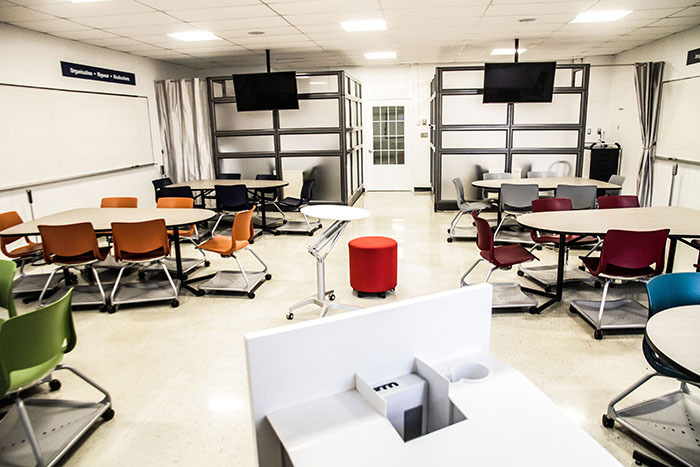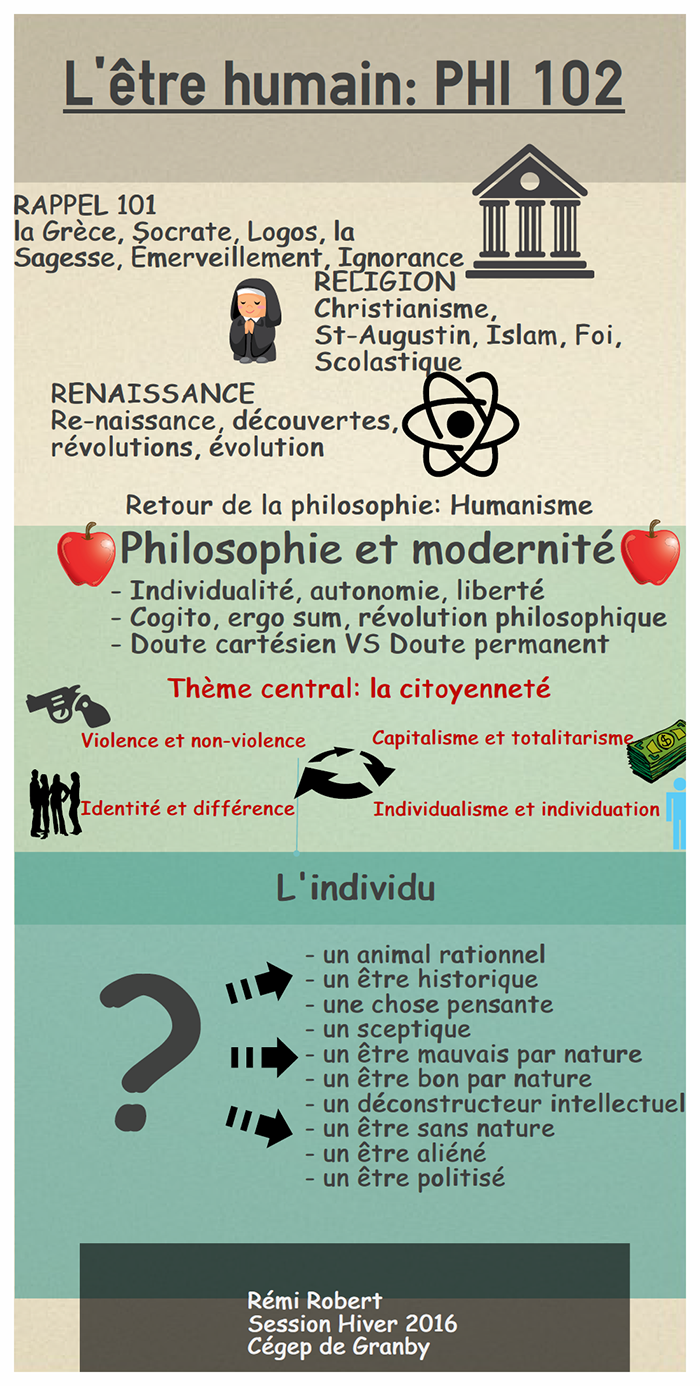A Philosophy Course Specially Designed for Students in Springboard to a DCS
Teaching in Springboard to a DCS involves several challenges:
- Increasing students’ sense of competence by instilling in them structuring work methods
- Helping students get to know themselves better by developing critical thinking
- Getting students to seriously commit to their college career
Meeting these challenges becomes possible as part of an orientation course that integrates philosophy, ICT and a project-based learning approach. I am proud to present this project, which I am developing with my colleague Katie Beauvais, guidance counselor and academic advisor.
A personalized approach for students at risk
In my teaching, I am very concerned about the equity of chances of success. Students with handicaps, adjustment difficulties, or learning difficulties (special needs students) require an adapted and personalized education. In fact, mass education is unable to meet these requirements. In general, the proportion of students in the Springboard to a DCS profile who have special needs is higher than in the other programs. Students in Springboard to a DCS exhibit demotivation, discouragement and sometimes severe disengagement from their studies. They are less equipped in reading and writing to pass general education courses such as literature and philosophy.
For this reason, in 2016, along with the direction of my college and Katie Beauvais, I developed a course entitled Projet d’orientation et méthodes d’apprentissage [Orientation Project and Learning Methods] that uses a philosophical approach. This course is specifically designed for students Students in Springboard to a DCS, Orientation profile.
This project is funded with the budget that the Ministry of Education and Higher Education has made available for students with special needs and is part of my doctoral research in applied philosophy. The goal is to promote the success of students in the Springboard to a DCS profile, while promoting a collaborative approach that brings together teachers, psychoeducators, academic counsellors and social workers. Indeed, academic difficulties result from a combination of socio-economic, socio-emotional or neurological factors.
The Projet d’orientation et méthodes d’apprentissage course is credited as a complementary course. In parallel, the enrolled students are taking the course entitled Philosophie et rationalité, [Philosophy and Rationality], which I also have the privilege to teach them. A meaningful relationship between them and me is thus created, since they meet me 3 times a week, which is beneficial for those who need routine and increased support.
The Projet d’orientation et méthodes d’apprentissage course is only available to students in the Springboard to a DCS profile. By grouping students at risk, I am able to better meet their individual needs.
I ask of the college’s administration that the groups I teach are made up of no more than 20 students. Because of budget constraints, this sometimes seems utopian, but it is nevertheless achievable. Having smaller groups of students allows for personalized support and, as a result, better results.
What Do Students Do in the Projet d’orientation et méthodes d’apprentissage course?
The course aims to enable students to acquire working methods while defining their vocational choice. To this end, the course uses a project-based approach based on Socrates’ maieutics.Through a variety of activities, students get to know themselves better. This eventually allows them to make better educational and professional choices.Gradually, students are led to think about their future. They must, among other things, prepare meetings with professionals. For example:
- Planning an internship or observation day
- Preparing questions for an interview with a resource person
- Reporting on their day and analyzing it in their logbook
Technological Tools
The course has a strong focus on the integration of technologies. The course takes place in one of the Active Learning Classrooms (ALC) at Cégep de Granby.

ALC C301 – Pedagogical Experimentation Laboratory. Image source: Enriching the Learning Environment at the Cégep de Granby with ALCs, an article by Huguette Dupont.
The most useful technological tool for the students and me, in the course, is OneDrive. After each class, students write in a personal logbook they keep on OneDrive. They write reflections related to the themes of the course and the workshops started in class. My follow-up (comments, critiques and suggestions) is assured in less than 48 hours.
Thanks to the cloud, I have access to all their files. I write in capital letters in their file. They have the choice whether or not to consider what I say by correcting their text in colour. At the end of the session, I can see and measure student progress.
I also use infographics in the course. With the site easel.ly, for example, students must create an infographic to represent how they use the resources that are available to them to succeed. At the end of the session, I also ask them to create an infographic to represent their personal evolution since the beginning of the course. They present it to their classmates as part of an oral presentation that constitutes the final evaluation.

An infographic I created with easel.ly for my students in Philosophy 102, L’être humain [The Human Being].
I also use other technological tools on an ad hoc basis. For example:
- Excel for students to create a table representing how their use of time over a week. The student can measure the time spent working, studying, for leisure …
- An interactive whiteboard for students to initiate themselves to sketchnote as part of a workshop on effective note-taking.
Teamwork
For the course, I have a lot of support from Katie Beauvais, guidance counselor and academic advisor at Cégep de Granby. In fact, we offer the course in the form of co-teaching. Katie is present for most of the class sessions and leads several workshops with students.
Individualized Follow-up
I am relieved of part of my teaching assignment to have the time to meet with each of my students individually for a period of 20 minutes, every 2 weeks. I discuss their progress with them, what brings them to CEGEP, and what they expect from CEGEP. I lead them to define their value system. This is part of a Socratic perspective: “Know Thyself”. Every 2 weeks, the guidance counselor, the psychoeducator and I meet for a period of one and a half hours to discuss the students’ situation, to take stock and share tips.
A Qualitative Approach to Success
I have a qualitative approach to success. In this sense, I consider that the most important for a student is to be able to define and assume a workload, and have the will to improve throughout the session. In my opinion, this is more important than the grade the student gets at the end of the semester. Learning, yes! But understanding, especially! That’s what I try to convey to students.Success remains a challenge, with or without ICT. As a result of my research, I conclude that ICT favour increased success rates, despite relatively low group averages. On average, students obtain 5% more than those who have a traditional approach. Soliciting accountability and creativity stimulates learners. The challenge remains to ensure true retention of knowledge.

